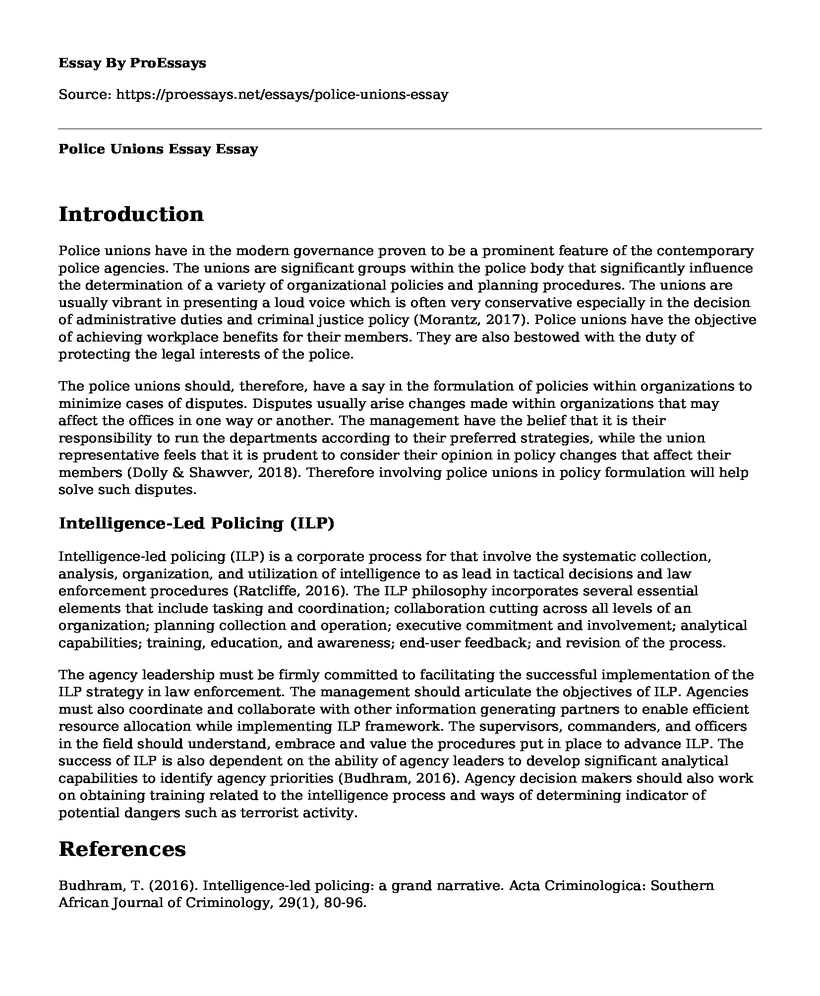Introduction
Police unions have in the modern governance proven to be a prominent feature of the contemporary police agencies. The unions are significant groups within the police body that significantly influence the determination of a variety of organizational policies and planning procedures. The unions are usually vibrant in presenting a loud voice which is often very conservative especially in the decision of administrative duties and criminal justice policy (Morantz, 2017). Police unions have the objective of achieving workplace benefits for their members. They are also bestowed with the duty of protecting the legal interests of the police.
The police unions should, therefore, have a say in the formulation of policies within organizations to minimize cases of disputes. Disputes usually arise changes made within organizations that may affect the offices in one way or another. The management have the belief that it is their responsibility to run the departments according to their preferred strategies, while the union representative feels that it is prudent to consider their opinion in policy changes that affect their members (Dolly & Shawver, 2018). Therefore involving police unions in policy formulation will help solve such disputes.
Intelligence-Led Policing (ILP)
Intelligence-led policing (ILP) is a corporate process for that involve the systematic collection, analysis, organization, and utilization of intelligence to as lead in tactical decisions and law enforcement procedures (Ratcliffe, 2016). The ILP philosophy incorporates several essential elements that include tasking and coordination; collaboration cutting across all levels of an organization; planning collection and operation; executive commitment and involvement; analytical capabilities; training, education, and awareness; end-user feedback; and revision of the process.
The agency leadership must be firmly committed to facilitating the successful implementation of the ILP strategy in law enforcement. The management should articulate the objectives of ILP. Agencies must also coordinate and collaborate with other information generating partners to enable efficient resource allocation while implementing ILP framework. The supervisors, commanders, and officers in the field should understand, embrace and value the procedures put in place to advance ILP. The success of ILP is also dependent on the ability of agency leaders to develop significant analytical capabilities to identify agency priorities (Budhram, 2016). Agency decision makers should also work on obtaining training related to the intelligence process and ways of determining indicator of potential dangers such as terrorist activity.
References
Budhram, T. (2016). Intelligence-led policing: a grand narrative. Acta Criminologica: Southern African Journal of Criminology, 29(1), 80-96.
Dolly, C., & Shawver, B. (2018). The Organizational and Practical Considerations of Starting a Crime Analysis Unit: A Case Study of a Midwestern Police Department. Policing: A Journal of Policy and Practice.
Morantz, A. D. (2017). What Unions Do for Regulation. Annual Review of Law and Social Science, 13, 515-534.
Ratcliffe, J. H. (2016). Intelligence-led policing. Routledge.
Cite this page
Police Unions Essay. (2022, May 15). Retrieved from https://proessays.net/essays/police-unions-essay
If you are the original author of this essay and no longer wish to have it published on the ProEssays website, please click below to request its removal:
- The Ethics of Police Deceptions during Interrogation - Paper Example
- First Amendment of the U.S. Constitution and Supreme Court Paper Example
- Why the President of the US Should Not Be Allowed to Use a Personal Twitter Account
- Debates in Criminal Justice Essay Example
- Government's Role in Ensuring National Health - Essay Sample
- US Government Reforms to Affordable Healthcare Act - Free Essay Sample
- Essay Sample on Sustaining Patient-Centered Medical Homes: Strategies, Innovations, and Policy Impacts







